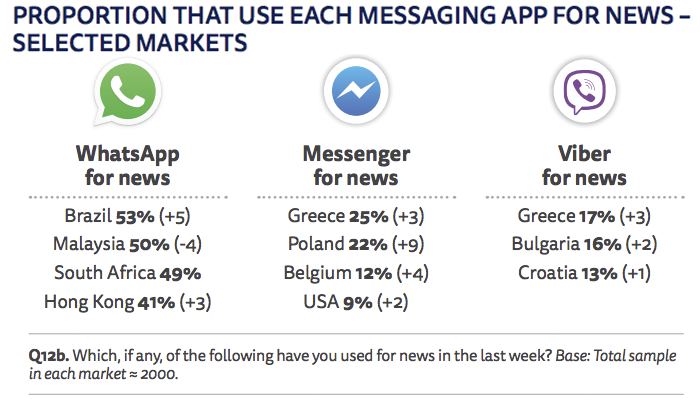Key takeouts from the Reuters Institute Digital News Report 2019
From subscription fatigue and closed networks to podcasts. Here are my key takeouts from the Reuters Institute for the Study of Journalism report on how news is being consumed in the digital era across the globe.
#1 Paying for news
The report finds growth in the number of paid subscribers for publications like the New York Times and the FT, as well as the success of alternative models like the Guardian’s membership scheme.
But the most interesting insight for me is that the subscription model can be an alternative to the digital advertising, which most online news media have historically relied on.
What's more, some predict that news is expected to compete with online video streaming services such as Netflix. Digital News Report also mentions 'subscription fatigue' -- the idea that users are becoming frustrated when constantly asked to pay separately for different online services.
#2 Groups and private networks
For the last couple of years, I've been benefiting from the closed communities online. A few running communities, including London City Runners, TechJPR group, and most recently Comms School -- a project I initiated with my boss Stephen Waddington.
The report shows that users are spending less time with relatively open networks like Facebook and more time with more private messaging applications like WhatsApp, Facebook Messenger, Viber, and Telegram. These are being used more heavily for news.
However, Facebook and WhatsApp groups don't usually cover news. In both networks, the Reuters Institute's data indicates that the most popular groups tend to be set up to discuss shared hobbies.
As study also mentions, there's an opportunity for publishers within closed groups; journalists are already starting to use them as a means of sourcing and distributing stories.
#3 Different news consumption by the younger generations
The younger audiences are increasingly harder to reach, but there's a huge appetite in harvesting their attention by the publishers.
The survey emphasises what's already been known for a while. Under-35s are glued to their phones and rely heavily on their devices. Across all markets, data from the report reveals that the smartphone is the main device used for accessing news for the vast majority of under-35s (69 per cent).
The study has also identified key news moments younger groups use to consume news. These include dedicated moments where they give time to news; a moment of update; time fillers; and intercepted moments where they receive alerts from news organisations or messages from friends with news.
#4 Podcasts will be are huge
It's not shocking that the medium of podcast is that popular. It's easily digestible (as the report shows, we listen to podcasts when doing chores, walking the dog, or when doing the laundry) and allow exploration of almost any topic imaginable.
The study reveals a few facts about podcasts. Over a half (55 per cent) of respondents listen to them on their smartphones, followed by laptops (27 per cent) and tablets (26 per cent).
The majority of podcast consumption happens at home (58 per cent), commuting on public transport (24 per cent) and via private transport such as the car or bike (20 per cent).
The study notices that Google, Apple and Spotify are also joining the podcasting space, and with emerging business models, the question about monetisation still remains open.
#5 Trust falling among Brits
The study has also explored the media consumption trends in the UK.
Trust in the news has fallen over 11 percentage points since 2015. The report highlights that the media brands are seen by many as pushing or suppressing agendas.
Some other interesting stats revealed include 27 per cent of Brits share news via social, messaging or email. Only 9 per cent pay for the news online. Meanwhile, Facebook, Twitter, and YouTube are the most popular social media networks in the country.
The study has been commissioned by the Reuters Institute for the Study of Journalism. Research was conducted by YouGov using an online questionnaire at the end of January/ beginning of February 2019. You can download the full report at digitalnewsreport.org.
***
If you have any suggestions, would like to guest post or give me a feedback, feel free to email me at kl.marcel [at] gmail.com, tweet me @marcelkl or connect with me on LinkedIn. Thanks for stopping by, have a splendid day!





